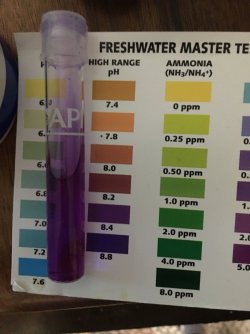bettafishlover86
Fish Fanatic
Its been a while since I’ve been here. I got out of the hobby and didn’t have much time for my tank but last week a did a deep clean and checked my water parameters and they were good. Two days I got a new betta to live with my harlequin raspboras in their 29 gallon tank and everything was going well until I realized he started being not as active and swimming slowly. I checked my ph and it instantly went to the highest possible measurement 8.8. I have no idea how the ph spiked so much. I’m performing a water change now. And ideas on how to get this down to a safe level quick and why it may have spiked? Edit: After water change ph is 7.0
Attachments
Last edited:


